How to Conduct Keyword Research in Languages You Don’t Speak?
Interview with Lukasz Żelezny and Step-by-Step Guide for Relevant Keyword Search

Entering new markets is always an exciting process. Your company's native language may not be widely spoken in your chosen country. And this raises a lot of questions: do you need to adapt your website, how to do keyword research in the new language, and more.
Even if it all looks incredibly difficult, keyword analysis will help you succeed with a little effort. In our new section, we'll go deeper into the peculiarities of working in different regions. Our first guest is a man with a long and successful career in international SEO, Lukacz Zelezny.

Lukasz Zelezny
Director at SEO.London
Since 2005, Lukasz Zelezny has been helping companies improve their organic performance – some of his past clients include HomeAway, Thomson Reuters, The Digital Property Group, Fleetway Travel, uSwitch, and Zoopla.
He is passionate about sharing his tips and knowledge with others through workshops and meetups. So every year, he attends numerous SEO and social media conferences. Including ClickZ Shanghai China, ClickZ Jakarta Indonesia, SiMGA Malta, SES London, Marketing Festival in Brno, Brighton SEO in Brighton, and UnGagged in London.
Ps, you can share your experiences with us too. Here you will find information on how.
Are there any differences between markets for SEO?
Let's start with whether there is any difference between the markets. If you have worked in the U.S. or any other large market, it may seem that business in other countries works exactly the same. But it’s essential to keep in mind that the difference in cultures and mentalities will affect your strategy.
The UK market is more mature, even often much more mature than the USA market. I can say that here we are looking for sustainable, long-term solutions. So it will be the first difference.
Another thing is that, for example, Poland has a specific language, website domains, Polish keywords, etc. And most companies are primarily focused on the Polish market, whereas in the UK, they are looking for a global perspective.
You can maybe see the same in Italian market.
Obviously, you may face linguistic differences in addition to cultural contrasts. Don't panic if you don't have natives on the team yet. It is within your power to do everything yourself.
You don't need really know the language to work in different markets. Once I worked in an Arabic market. There are other languages. Even letters are different there. If you do everything correctly, you can look at metrics, and if there are good keywords, you will see them anyway.
As well, I have another example. The Netherlands is quite small country, and content writers are not that many. Not everyone from abroad can speak dutch. So the prices for content are relatively high.
When I have to work there, we translate texts to dutch by AI, and then a native guy reviews it.
Website Localization vs. Translation: Which Is Better for SEO?
When entering a new market, sometimes you want to take the easy way out: give all the texts to a translation agency and not bother with localization. But will it work? That is the big question.
When you localize a website, you fully adapt the content to the new market, do keyword research, and change some elements in the interface to make it understandable for local users.
Localization will work better. It will take more on the board than just language differences. It's, in fact, a complete content adaptation with keyword research and so forth.
Unfortunately, often this is an extra cost, and in some cases, you don't really need to localize. In the above, translating content with AI + proofreading will be more than enough.
Website Localization vs. Translation: Which Is Better for SEO?
I will give you two common examples.
Often a word-for-word translation can fail to convey the correct meaning. This is especially relevant to idioms as they can be very different in various languages.
Also, some brand names can be translated, for example, Apple.
Often, the translator may not catch the subtle differences between words, so you will not get the most accurate result.
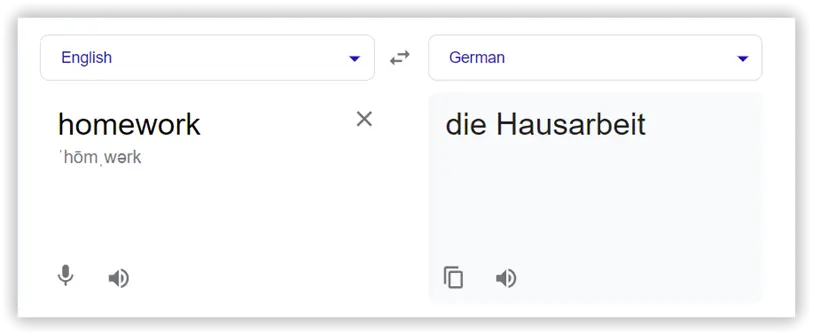
For example, "homework" can be translated in German as "hausarbeit." However, this word is more commonly used to describe housework.
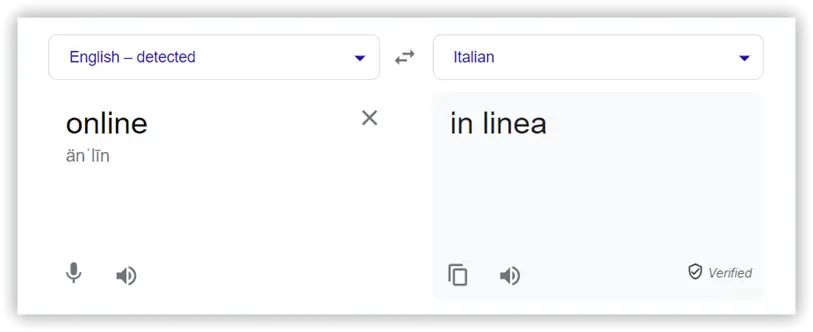
And this is how Google Translator translates the word "online” to Italian. Let's check its volume.

For comparison, let's take the word "online" and also check its volume. As you can see it’s higher.

As you can see, relying only on translation is not the most reliable strategy. Grammar, word formation, dialect, and even slang affect the search volume. Many languages have norms and traditions that the translator may simply not be aware of.
That’s why direct translation often has a lower volume and checking relevance via SERPs becomes critical.
How to Do Keyword Research in Any Language?
When conducting international keyword research, you may find yourself in 2 situations:
1) The company is just beginning its journey in the market, and keyword research needs to start from scratch.
2) Your client already has keywords, and your task is expanding or optimizing them.
Since you don't understand the research language, it's essential to stick to the basic principles that you already know.
Starting From Scratch
The easiest way to research your site is to identify your competitors and analyze the missing keyword.
1. Choose a phrase in the source language and translate it

2. Look at the search engine results for the query
Sometimes word-for-word translation can slightly distort the original meaning. Google will help us see the current results, even if it's not the most accurate query.
Make sure to change the language of the search engine to get the needed data.
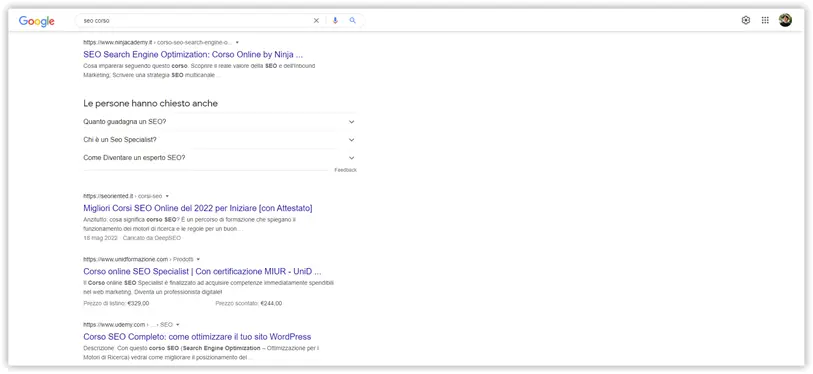
3. See what keywords are used to rank articles in the top
You can do it using Serpstat. Go to URL analysis - Keywords. When searching, select the required region.
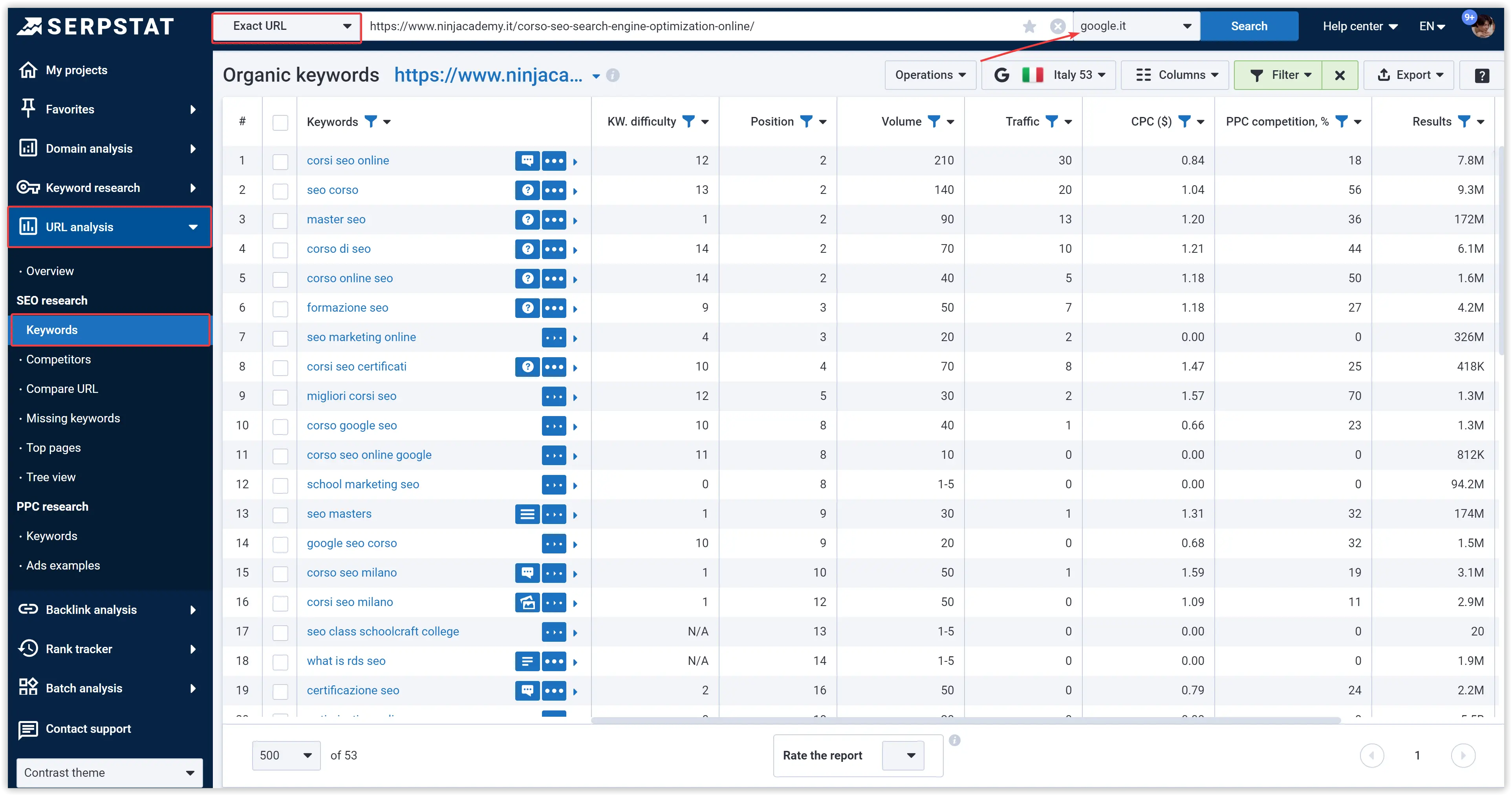
As previously stated, working with an unknown language necessitates reliance on tried and true methods and metrics.
This report will show you the volume of keywords that you are already familiar with. You can safely compare keyword volumes as a percentage across countries because the method for calculating search volume is the same for different regions and languages.
As a result, if you know how popular a particular keyword is, you can use this to your advantage.
4. Don't forget to check the translation of the phrases to make sure they are relevant
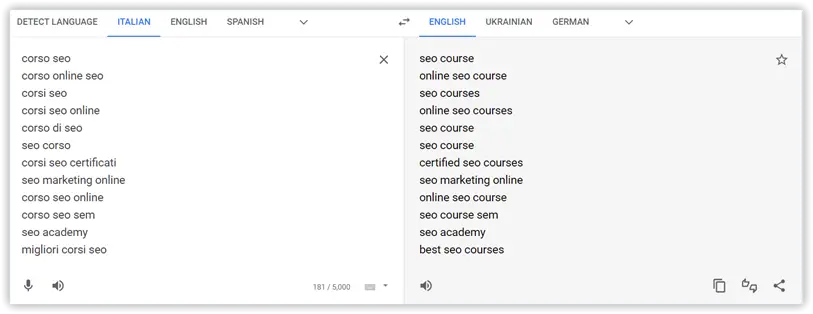
Increasing Your Keyword List
Perhaps you're running projects that are already working in other markets? If so, you already have a list of keywords that colleagues or customers have given you. Let's figure out how to expand it.
- Explore matching keywords through the Related keywords tool.
For that, go to the Keyword Research module - Related keywords.
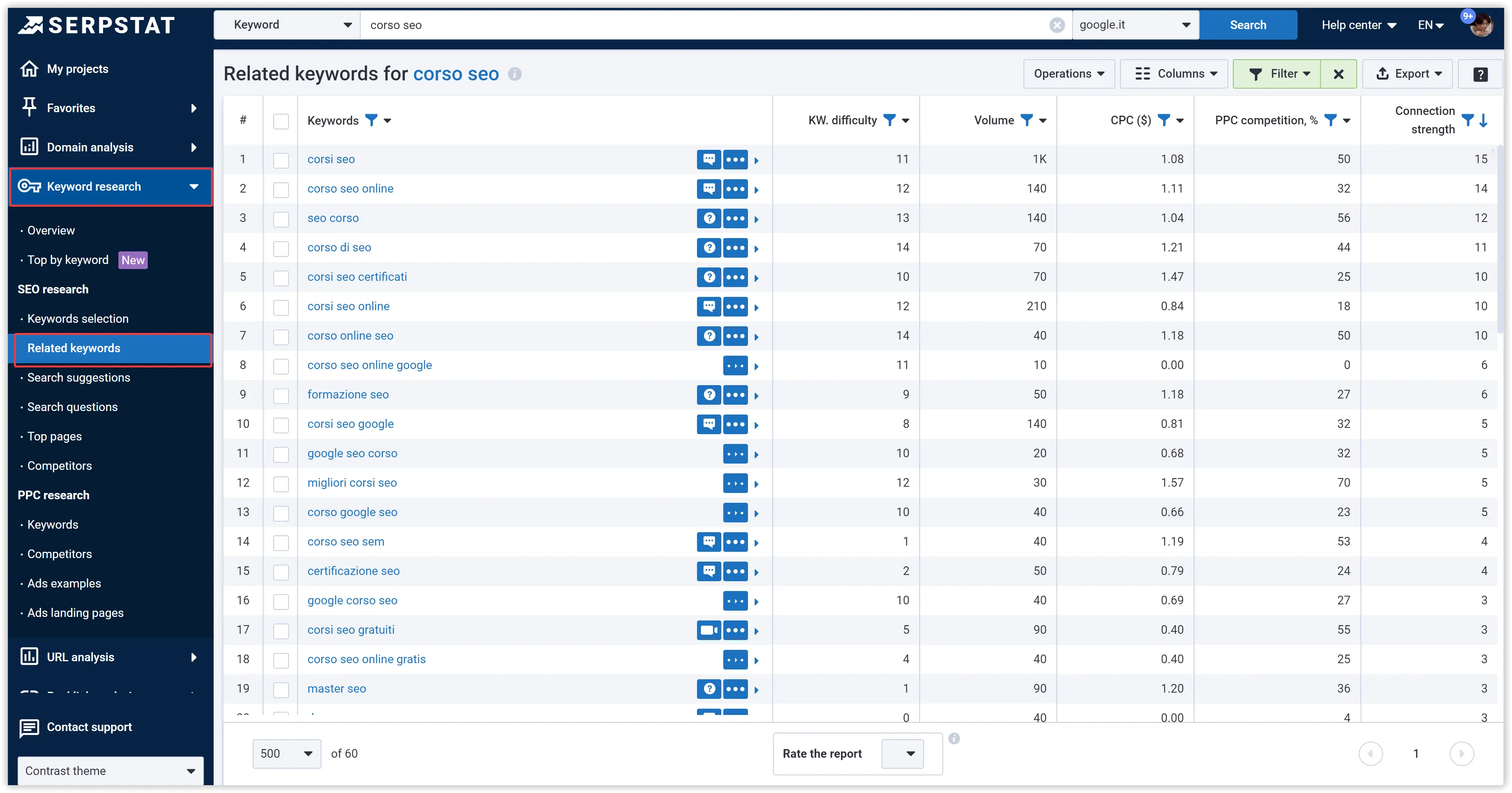
- Find keywords used by your competitors
The Missing Phrases report shows keywords for which competitors are ranked in the top 10 of search results and which were not found on the analyzed page.
You can easily do it in Serpstat. Just open URL analysis and go to Missing keywords.

- Save the reports and translate the words to weed out irrelevant variants. Also, if anyone on your team speaks the language of the project, ask them to check the terms.
Congratulations, you have your keyword list! Now you can work with it just like you would with any other.
The UK market is more mature, even often much more mature than the USA market. I can say that here we are looking for sustainable, long-term solutions. So it will be the first difference.
Another thing is that, for example, Poland has a specific language, website domains, Polish keywords, etc. And most companies are primarily focused on the Polish market, whereas in the UK, they are looking for a global perspective.
You can maybe see the same in Italian market.
Can AI Help With Projects From Other Countries? If So, How?
Without a single doubt, it can. The only thing is that proofreading is necessary. AI is still a bit behind perfect translation. Writing from scratch looks, however, almost there.
Sometimes you can get grammatically correct nonsense. It doesn't bring any value but sounds ok. I'm joking: bring some content from AI and give it to another AI that would read it. So remember that you're writing for people. Let someone check this content to make sure it's good for humans.
It isn't easy to put expert thoughts through AI. Some topics are just difficult for it. But still, AI can do lots of FAQs.
Suppose you have a website about coffee. You may answer the question about arabica coffee, which people often search.
And AI will give you many answers to this question. You can choose one, combine them or use it as a base for your own content.
Instead of a Conclusion, Lukacz Gave Advice to SEO Specialists Who Work in Local Markets.
1) Go to conferences. Try to see what people in other markets do. Often it makes sense to focus only on the local market. But you still have to see broader.
2) Don’t stick with one tool. There are a lot of different instruments to work with. Sometimes, using a tool correctly can be more efficient than people who do the same manually. For example, I use an AI service for internal linking. And it saves my time a lot!
Also, I know that there are many local tools. For example, Semstorm is a local SEO tool in Poland. Many specialists use it working there. But try to combine Semstorm with some global SEO tools. They often have more extensive databases, and it will help you succeed in the local marke
Start Finding
Keyword Ideas
Sign up and try for free
Discover More SEO Tools
Backlink Cheсker
Backlinks checking for any site. Increase the power of your backlink profile
API for SEO
Search big data and get results using SEO API
Competitor Website Analytics
Complete analysis of competitors' websites for SEO and PPC
Keyword Rank Checker
Google Keyword Rankings Checker - gain valuable insights into your website's search engine rankings
Recommended posts
Cases, life hacks, researches, and useful articles
Don’t you have time to follow the news? No worries! Our editor will choose articles that will definitely help you with your work. Join our cozy community :)
By clicking the button, you agree to our privacy policy.